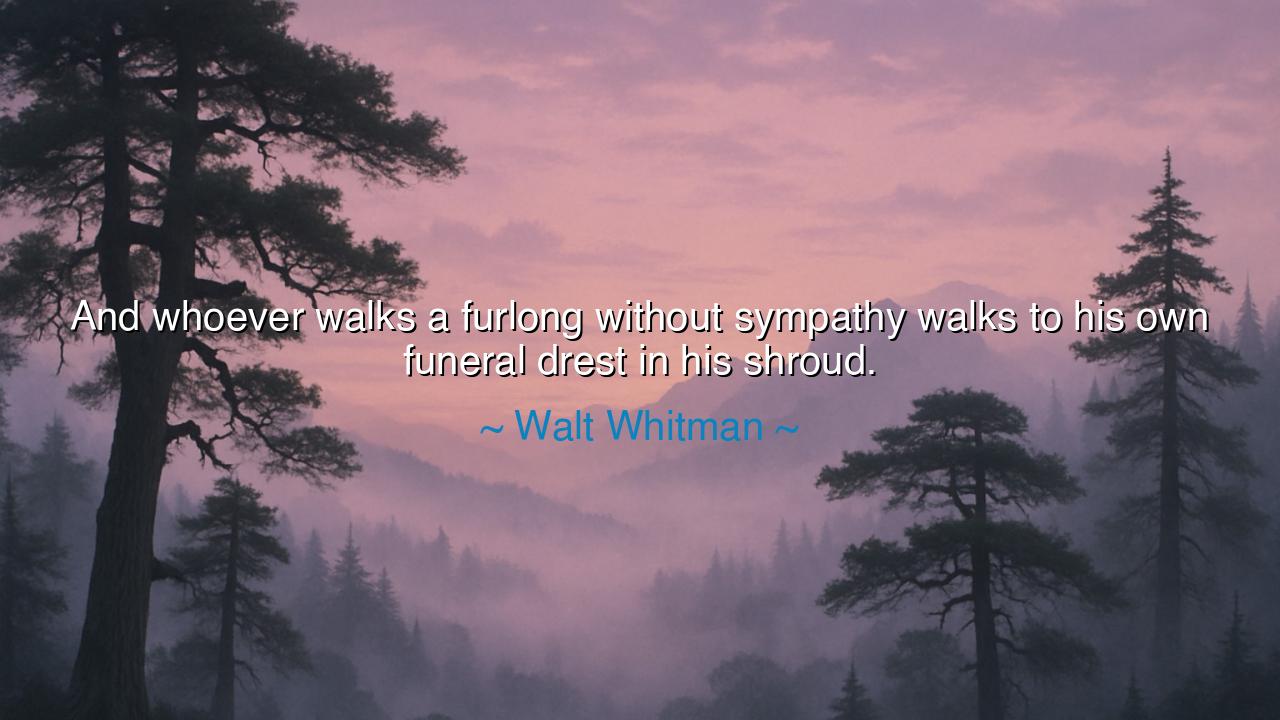
And whoever walks a furlong without sympathy walks to his own
And whoever walks a furlong without sympathy walks to his own funeral drest in his shroud.






"And whoever walks a furlong without sympathy walks to his own funeral drest in his shroud." With these words, Walt Whitman offers a profound meditation on the essential nature of sympathy and the inevitable corrosion of the soul when it is lacking in this fundamental human quality. The image Whitman paints here is vivid and haunting—the idea that one who moves through life without empathy or connection to others is, in essence, walking toward their own death, spiritually and emotionally. Sympathy is the lifeblood of human interaction, and without it, life becomes devoid of true meaning, reducing the individual to a cold existence devoid of warmth, community, and understanding.
The ancient philosophers understood the vital importance of sympathy and human connection. Aristotle, in his writings on ethics, spoke of the necessity of compassion and virtue as fundamental to leading a good life. To live in a way that is truly noble, one must not only seek one's own growth but also be attuned to the suffering and joy of others. Sympathy, in the ancient world, was seen as a reflection of a person’s moral integrity—an essential quality for anyone who hoped to live a life of virtue. Whitman’s words reflect this ancient truth, that the absence of empathy leads not to the flourishing of the individual but to a hollow existence, where the soul is disconnected from the rest of humanity.
Consider the tragic hero of Sophocles’ Antigone, whose unwavering devotion to her family and her sense of justice leads her to defy the king. Antigone’s compassion for her brother, though it goes against the law, demonstrates the power of sympathy to guide actions that transcend the personal and reach for something greater than individual gain. Her compassion, however, ultimately leads to her downfall, showing that when one acts without the sympathy of others, or worse, with a lack of understanding for the shared human condition, there are grave consequences. Just as Antigone’s refusal to compromise ultimately brings her ruin, Whitman suggests that a life lived without sympathy, disconnected from the emotional currents that bind us all, leads not to triumph, but to spiritual decay and desolation.
In Whitman’s perspective, walking without sympathy is akin to living in isolation, disconnected from the fabric of humanity. Empathy, after all, is the thread that weaves individuals into a greater whole—a society that recognizes and nurtures the common experience of suffering and joy. Nelson Mandela, though imprisoned for twenty-seven years, exemplified this kind of empathy. Rather than allowing his years of suffering to harden him or breed resentment, Mandela reached out with compassion to his oppressors, understanding that reconciliation, not vengeance, was the path to healing his broken nation. His life was a powerful testimony to the truth of Whitman’s words: that without sympathy, we are not merely isolated but spiritually dead, trapped in a life that lacks meaning and purpose.
The lesson in Whitman’s statement is a call to live with compassion—to actively engage with the world and those around us, to recognize the suffering of others as intimately connected to our own. In practical terms, Whitman urges us to reach out in empathy, to move through the world with awareness of the struggles and joys of others. To live a life without sympathy is to be blind to the connections that bind us all. In our own lives, we must ask: How can we cultivate empathy? How can we reach beyond our own experiences to understand the lives of others? Just as Mandela’s empathy healed a nation, so too can our compassion heal our communities, our families, and ourselves. It is through genuine connection that we begin to live lives of depth and meaning, where our actions and words reflect the interconnectedness of humanity.
The truth that Whitman’s words reveal is timeless. As we navigate our lives, we must constantly remind ourselves that our connection to others is what gives life its richness and purpose. Sympathy does not come from simple acts of charity or pity, but from truly understanding the pain and joy of others, and seeing our shared humanity reflected in them. In this way, Whitman is not merely offering a poetic image, but a call to action—to live each day fully engaged with the lives around us, to cultivate a heart that is open, understanding, and willing to listen. It is this engagement with others that prevents us from walking down the lonely, empty path to our own spiritual funeral.
In the end, Whitman’s wisdom is a timeless reminder that our greatest purpose in life is to love, to feel, and to connect. If we move through the world with compassion, we create bonds that transcend the superficial divides between us. The heart that forgets its sorrow is one that has been touched by the suffering of others, and through that touch, it finds a new kind of life—one that is richer, deeper, and more connected to the world. Thus, we are called to live not as isolated individuals, but as part of the great tapestry of humanity, weaving our stories with those of others in a dance of compassion, understanding, and shared experience.






AAdministratorAdministrator
Welcome, honored guests. Please leave a comment, we will respond soon